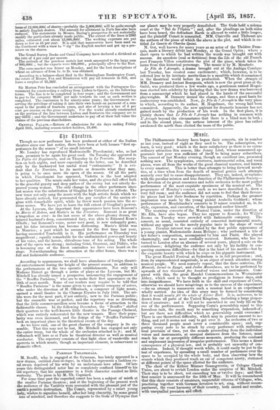PARISIAN TREATRICA.LS.
M. Bouffe, who is engaged at the Gymnase, has lately appeared in a new drama, entitled Jean-le-toque, in which he represents a luckless rural swain deprived of his wits by an unfortunate love affair. Of late years this distinguished actor has so completely confined himself to his old repertory, that his appearance in a fresh character excited no little curiosity. The piece is by M. Th. Copier&
For some time past the expected comet has been a subject of mirth at the smaller Parisian theatres ; and at the beginning of the present week the audience of the Varietes were recreated with the pleasant jest of the earth's possible destruction, The Comet, represented by a smart young lady, wishes to signalize herself, after her long obscurity, by some grand ieee of mischief, and therefore she suggests to the Gods of Olympus that our planet may be very properly demolished. The Gods hold a solemn court at the " Bal de l'Opera " ; and, after the pleadings on both sides have been heard, the defendant Earth is allowed to exist a little longer, and the plaintiff Comet is nonsuited. MM. Clairville and Thiboust are the authors of the piece of which the above is the plot, and which is entitled La Comite de Charles Quint.
M. Got, well known for many_ years as an actor of the Theatre Francais, made a literary daft last Monday, at the Grand Opera; where a short opera to which he had written the words was brought out with success. An anecdote (real or fictitious) from the life of the old French poet Francois Villon constitutes the plot of the piece, which takes its name from this historical personage. The music is by M. Membree.
Le File de 1 'elveugk, a drama brought out at the Ambigu Comique last Tuesday, has created sonic excitement ; which, however, is to be referred less to its intrinsic merits than to a squabble which it occasioned in the theatrical world before its production. When the Areetgle of MM. Dennery and Amicet Bourgeois, which is now the great piece at the Gaite, was produced there a few weeks ago, a gentleman named Hugelman started into celebrity by declaring that the new drama was borrowed from a manuscript which he had placed in the hands of the successful playwrights. M. Deanery denied the charge, and thus a good basis for controversy was established. Now, Le File de l'Avettyle is the very piece in which, according to its author, M. Hugelman, the wrong had been committed. Apparently, the new aspirant for dramatic honours has not gained much by the production of his work. In the first place, it is plainly shown that Le File de P.Aveugle has nothing in common with L'Aveugle beyond the circumstance that there is a blind man in both ; and in the second place, the serious interest of the piece has rather awakened the mirth than elicited the tears of the public.
























 Previous page
Previous page